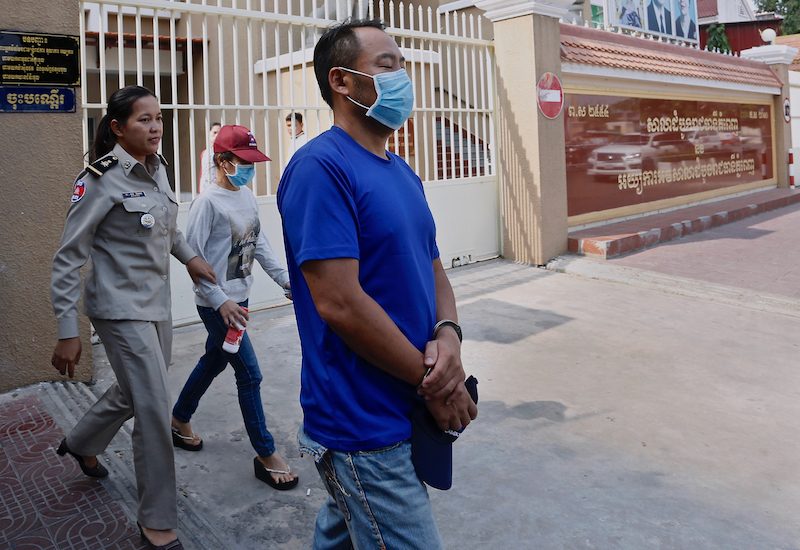A Japanese bar manager and two Cambodians faced formal charges on Tuesday for allegedly tricking a group of local women into forced sex labor in Japan.
Susumu Fukui, the 52-year-old manager of Cosplay Bar Pirate in Phnom Penh, Lim Leakna, his 28-year-old wife, and Seng Chandy, a 34-year-old employee of the bar, were charged with unlawful recruitment for exploitation at Phnom Penh Municipal Court and could face prison time of between seven and 15 years.

The trio were arrested on Saturday for allegedly luring 10 Cambodian women to work in Japan with promises of high wages, according to an article on the National Police website. Authorities say that Mr. Fukui arranged the victims’ visas while his employee, Mr. Chandy, coordinated the women’s passports.
When seven of the women arrived Japan’s Gunma prefecture, they had their passports confiscated by a local restaurant owner and were forced into sex work there, the article says.
Japanese police rescued the women in December after the victims contacted the Cambodian Embassy in Tokyo through its Facebook page. Authorities later arrested two Japanese men and one Thai woman for hiring the women, aged 20 to 36, without proper visas, according to Japanese media reports.
Cambodia’s National Police could not be reached for comment on Tuesday.
Mr. Fukui’s “cosplay” bar—a contraction of “costume play”—on the backpacker strip of Street 172 was shuttered on Tuesday and its signs plastered over with newspaper.
The building’s 52-year-old owner Eam Heng said he could not recall the names of the Japanese man and his Cambodian wife, who he said had rented his ground floor for the last four years, but said they were good tenants.
“I wanted them to continue, but they wanted to end it,” he said of the lease, recalling that the Japanese man had moved out about a month ago and speculating that “it was time for him to go back to his country.”
“There were never any prostitutes here,” Mr. Heng said. “They just sold rice and food, and alcohol as well.”

The six-table venue seemed hastily abandoned and was still stocked with menus, liquor and dishes hanging in a small kitchen. A laminated sign courted customers in Japanese with promises that “cute Cambodian girls will welcome you in English and Japanese.”
The bar’s Facebook page shows photographs of a half-dozen or so young Cambodian women wearing close-cropped kimonos, dresses and nurse outfits at the bar. Some of the photos crop out the women’s faces, focusing on their chests or legs.
Moeun Tola, head of the labor rights group Central, said he was not familiar with the details of the case, but that it broadly fit with a pattern of similar crimes.
Sex trafficking victims are usually recruited by Cambodians—sometimes with foreign husbands who had connections back home—with promises of high pay and easy work abroad, only to arrive in the country and have their passports confiscated and their connection with the outside world cut off, Mr. Tola said.
“And then the broker threatens the victim, [saying] it’s not only her that will have a problem, but her family will have a problem,” he said.
The Japanese victims’ contact through Facebook was a rare breakthrough, according to Mr. Tola.
In most cases, “the victim has no idea where to go,” he said.
(Additional reporting by Ouch Sony)




